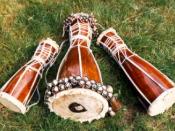Haiti and Cuba in the African Diaspora
The movement of the African culture to the New World contributed to the cultural diversity in the new lands. The geographic locations of Haiti, Cuba, and many other locations played a major role in the amount of similarities between these cultures and those of West Africa. This was because the Atlantic Ocean was the only obstacle that separated West Africa from the Americas.
Many of the slaves brought to Haiti and Cuba were Yoruba-speaking people. They worshipped more than 400 gods, which are still worshipped today. No doubt, they brought their religious practices with them. The main religion of the Spanish colonizers was Catholicism. It was taught to the Africans. This syncretism of religions resulted in Voodooism in Haiti and Santeria in Cuba. Haitian and Cuban dances show African origin not only in their religious foundations, but in their rhythmic movements and patterns.
In Haiti, Vodun or what we call voodoo, like Christianity, is a religion of many traditions. Each group follows a different spiritual path and worships a slightly different pantheon of spirits, called Loa. The word means "mystery" in the Yoruba language.
Yoruba's traditional belief included a chief God Olorun, who is remote and unknowable. The purpose of rituals in the Haitian culture is to make contact with a spirit, to gain their favor by offering them animal sacrifices and gifts, to obtain help in the form of more abundant food, higher standard of living, and improved health. Humans and Loa depend upon each other. Humans provide food and other materials and the Loa provides health, protection from evil spirits, and good fortune. Rituals are held to celebrate lucky events, to attempt to escape a run of bad fortune, to celebrate a seasonal day of celebration associated with a Loa, for...


